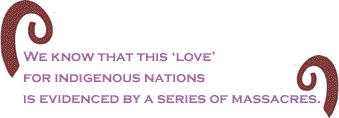
|
|||||||||||||||||||||
|
In 1864, Colonel John Chivington surveyed his troops with pride as they galloped into a Colorado town. The locals cheered these "brave" cavalry men who were returning from their recent massacre of the "savages" at Sand Creek. The mounted soldiers waved more than a few newly harvested scalps of elderly Indian men. But more than a few of these soldiers had very special trophies in the form of Indian female genitalia that they had carved from their "enemies" and attached to their hats. In this Thanksgiving season, we are asked to be grateful that European settlers extended the hand of friendship to their Native brethren, and lived alongside them in harmony and in the spirit of brotherhood. Thanks to the research of brilliant scholar Ward Churchill, we know that this "love" for indigenous nations is evidenced by a series of massacres, including an 1833 incident when men, women and children of the Sauk Nation were slaughtered near the Mississippi River after having been driven from their homes in Illinois. In 1854, 150 Lakotas were massacred in Nebraska. In 1863, 500 Shoshones were killed in Idaho. In 1868, 300 Cheyenne were massacred in Oklahoma. Scores of other Cheyenne were killed in Kansas, Nebraska and Wounded Knee, South Dakota in 1875, 1878 and 1890 respectively. Between 1778 and 1871, the U.S. government entered into approximately 400 treaties with indigenous nations. The government violated the terms of every last treaty. Countless numbers of children from indigenous nations were taken from their homes and shipped off to boarding schools where every ounce of their culture was forced out of them. We Africans also know of genocide. We too have been the targets of efforts to strip us of our culture. Perhaps most importantly our land, Africa (like the land of the indigenous nations of the Americas), has been stolen by western capitalists. Our determination to regain control of every square inch of Africa for the benefit of the African masses worldwide is matched only by the determination of other indigenous nations everywhere to do the same with respect to their respective homelands.
In our quest for control of Africa, we Africans are driven by the knowledge that control of land translates into power that can ultimately be manifested in the form of diplomatic, military and economic advantage for all who are part of the African Nation regardless of their country of residence. On a more basic level, we understand that by any moral yardstick, the injustice of settler colonialism can be corrected only by a return of stolen land to indigenous populations. If we demand Africa for the Africans, and Palestine for the Palestinians, we simply cannot deny that same right to the indigenous nations of the Americas. Thus, those among us who harbor bourgeois dreams of integrating ourselves into the American institutions and structures that maintain dominance of stolen territory for the descendants of European invaders must come to understand that we are instead morally obligated to stand shoulder to shoulder with those who are indigenous to the western hemisphere, and to do everything in our power to help them reclaim their land from the U.S. empire. Progressive and revolutionary Africans are not exempt from this admonition. Dozens of leftist organizations have a detailed vision of a new socialist North American society. Unless these organizations have consulted first with the indigenous nations and obtained their consent, any plans for a new, revolutionary state on North American soil are both presumptuous and arrogant. When we consider that countless enslaved Africans who escaped from plantations were given refuge by indigenous nations, we have an even greater obligation to engage in serious, ongoing discussions with America’s first nations about how we can help them take back their stolen continent. Mark
P. Fancher is the author of "The Splintering of Global
Africa: Capitalism’s War Against Pan-Africanism." |
November 27,
2003 |
||||||||||||
|
||||||||||||
|
|
||||||||||||
| Printer Friendly Version | ||||||||||||
| |
||||||||||||
| |
||||||||||||


























